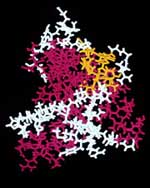Gene may fend off prions

Part of a prion, the protein implicated in vCJD <br>© SPL <br>
A gene may protect people against variant Creutzfeldt-Jakob disease.
People who lack a gene involved in immune responses may be three times more likely to suffer from variant Creutzfeldt-Jakob disease (vCJD), a new study suggests1. The result, if borne out in larger studies, could point researchers toward therapies for the incurable brain disease.
vCJD is thought to occur when people are exposed to misshapen prion proteins from cows with bovine spongiform encephalopathy – BSE or ’mad cow disease’. The gene does not appear to protect against the sporadic form of the disease (CJD).
Of 50 patients with vCJD – about half of those known to have the disease – only 12% have a gene called DQ7, John Collinge of Imperial College School of Medicine in London and his colleagues have found. In contrast, 36% of the normal population has the gene.
The small number of participants makes it difficult to draw conclusions from the study, experts warn. “These kinds of studies are very susceptible to false positive findings,” says Cornelia van Duijn, a genetic epidemiologist at Erasmus University Medical School in Rotterdam.
But, by shedding light on susceptibility to the disease, the study could improve estimates of how many people will develop it, van Duijn adds.
It would take something like 500 patients – many more than have been diagnosed – to get truly reliable findings, says Stephen O’Brien, a geneticist at that US National Cancer Institute in Maryland. Nonetheless, he says, “the results are provocative and make us want to know if they’re right”.
It would be good to test a larger sample, agrees Collinge.
Although the findings do not point to any immediate therapy for the disease they could help researchers looking for treatments. “If we can understand why DQ7 is important in protecting against vCJD, it might open up new avenues to treatment,” Collinge says.
References
- Jackson, G. S. et al. HLA-DQ7 antigen and resistance to variant CJD. Nature, 414, 269 – 270, (2001).
Media Contact
More Information:
http://www.nature.com/nsu/All latest news from the category: Health and Medicine
This subject area encompasses research and studies in the field of human medicine.
Among the wide-ranging list of topics covered here are anesthesiology, anatomy, surgery, human genetics, hygiene and environmental medicine, internal medicine, neurology, pharmacology, physiology, urology and dental medicine.
Newest articles

High-energy-density aqueous battery based on halogen multi-electron transfer
Traditional non-aqueous lithium-ion batteries have a high energy density, but their safety is compromised due to the flammable organic electrolytes they utilize. Aqueous batteries use water as the solvent for…

First-ever combined heart pump and pig kidney transplant
…gives new hope to patient with terminal illness. Surgeons at NYU Langone Health performed the first-ever combined mechanical heart pump and gene-edited pig kidney transplant surgery in a 54-year-old woman…

Biophysics: Testing how well biomarkers work
LMU researchers have developed a method to determine how reliably target proteins can be labeled using super-resolution fluorescence microscopy. Modern microscopy techniques make it possible to examine the inner workings…





















